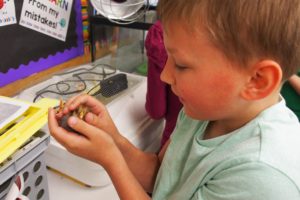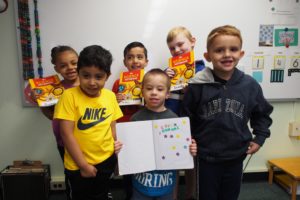Cooperative Extension Brings Chickens to the Classroom
By Jason Detzel
Last year I received a grant from the New York 4-H Development Program to complete a poultry project with 4-H youth in the County. Naturally I chose to purchase an incubator, fertile eggs, and some supplies to teach a class on hatching chickens and to showcase the process at the Ulster County Fair.
Why hatching chicks? Children grow to interact and understand the world though the guidance of caregivers and teachers. Hatching out chickens allows us to introduce sensitive topics in a supportive manner to the people in our society who often have the most difficult time making sense of the world around them. Introducing these themes in real time and as they occur in an applied setting gives kids the room to think about what they are doing, to question why things are happening, and ultimately sort through the information and teach others about the experience.
As a team we can monitor the incubator daily, candle the eggs for signs of life, and eventually experience a new life coming into the world and all the responsibilities and chores that go along with nurturing them. Besides the beauty and excitement of birth, there is the other side of this project that is just as integral. Chicks that do not hatch, chicks that are sick, different, need a little extra help, and those that die all come with embedded lessons and understandings.
In my former life, the one where I didn’t look at poop in a microscope or talk about fistulas, I was a special education teacher. For about ten years I taught, lived, laughed, and cried with students and their families as they made their way through a world largely developed for neurotypical folks. With that in mind, I made the decision to only offer this course to special ed. classrooms in the Kingston City School District, and boy was I impressed.
These were not the clinical classrooms that I have seen in the past but vibrant and supportive rooms of learning where kids could be safe, be themselves, and work towards mastering the skills that will allow them to be as independent as possible. I find that we sometimes take for granted the fact that these kids are not challenged as often as their peers in their daily lives. So with the help of some truly phenomenal teachers and aides (and I’m not just saying that, my time in the classroom allowed me to witness the fair, caring, and stable relationships that these teams exude), we set out to both teach and learn together though the chicken hatching project.
So we got down to business. With the help of the teachers and the aides we hosted a classroom session where we presented the daily logs, the student responsibilities, talked about the process and the perils of growing chicks out in the classroom, and began introducing the complex and amazing process that transforms a few cells in an egg to an eating, walking, and pooping chicken. It was amazing to watch the students make the connections between the biological development of the chicks and of themselves. Some of the students enjoyed cleaning or filling in the logs but all of them enjoyed their time playing and handling the tiny birds. This became obvious on the last day of project when I came to pick up the chicks to bring them to their new farm home. After a little over a month spent caring for and interacting with the chicks, the students were sad to see them go and we had more than a few tears as I left with the little ones in a simple cardboard box.
All of the classroom project were a success but that does not mean that all the chicks hatched. In fact, one classroom had zero chicks hatch and another lost the majority of their animals only days before the big day. But the purpose of this was not to hatch chicks; the purpose was to introduce life lesson to students and to help them grow and learn in a supportive environment and in this regard I know that we exceeded this goal.
Jason Detzel is a livestock educator with Cornell Cooperative Extension of Ulster County




I would like to set up the hatching program for my school in Harlem NY.